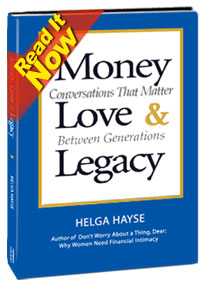Opinion: Americans need to face up to end of life planning
By Helga Hayse
Doctors have, over the years, quietly advised patients about care options at a time of a medical emergency or terminal illness. On Jan. 1, the government announced that doctors would be reimbursed by Medicare for end-of-life counseling during a regular office visit. Four days later, the government changed its position. With lightning speed, a medical decision has once again become a political one.
This is terrible news for patients and their families who need to open the discussions about end-of-life care.
Advance care counseling is long overdue and can bring incredible peace of mind. As a culture, we'd rather do anything than talk or even think about our own death. Psychiatrists have long equated the reluctance to draw up a will or estate plan with this fear of death.
Millions of families find themselves without guidance or direction when faced with a medical emergency or unexpected death. The legal forms for a living will and health care proxy haven't been filled out. No one wanted to think about the possibility that they might be needed.
We have all kinds of ways of not thinking about our death. Denial allows us to pretend that we won't be caught in that situation. We postpone filling out forms until "We're not so busy." We're paralyzed by our foolish superstition that makes signing papers a signal to God that we're ready to die. What about optimism that we'll just die in our sleep, or during sex, or our favorite sport? Why spoil the quality of life by being negative?
However, a medical emergency or a tipping point in a chronic illness will trigger the need for a living will and a health care proxy, the documents that form the basis for advance medical planning.
The living will, a medical directive form, lets others know what medical procedures and treatments we want and the conditions under which we want them. Without this, our families will struggle with decisions they have to make that may not be what we want. The health care proxy or durable power of attorney form lets us choose someone we trust to make decisions for us if we can't make them for ourselves.
Why should any child be put into a situation of predicting a parent's wishes? What a huge responsibility for parents to shunt off on children -- one that is often complicated by the possibility of friction with other siblings. Why force people you love to read your mind and make heart-rending decisions in a time of crisis? Isn't it better for both generations to talk about what they want in case they can't speak for themselves at the time -- and to put it in writing?
For example, in the Terri Schiavo case, determining what a loved one would want was neither a simple nor clear decision.
The young woman was left in a persistent vegetative state after having a cardiac arrest. Unconscious and sustained by artificial hydration and nutrition through a feeding tube, Terri was unable to speak for herself. Because she had no official medical directive, her husband, who argued that she would not have wanted to be kept alive in this fashion, was locked into a 15-year battle with her parents, who refused to allow the withdrawal of the life-sustaining technologies.
The culture of silence around financial and estate planning, medical directives, powers of attorney, lifestyle preferences and end-of-life care results in countless unnecessary financial, legal, and social complications and pain for millions of people. That's too bad; advance care planning of all kinds is a smart and loving thing to do for our families.
HELGA HAYSE is the author of "Money, Love & Legacy: Conversations that Matter Between Generations" She wrote this article for this newspaper.


